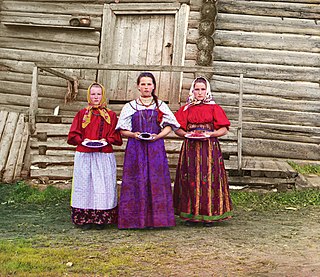
A peasant is a pre-industrial agricultural laborer or farmer, especially one living in the Middle Ages under feudalism and paying rent, tax, fees, or services to a landlord. In Europe, peasants were divided into three classes according to their personal status: slave, serf, and free tenant. Peasants either hold title to land in fee simple, or hold land by any of several forms of land tenure, among them socage, quit-rent, leasehold, and copyhold.
A doxology is a short hymn of praises to God in various forms of Christian worship, often added to the end of canticles, psalms, and hymns. The tradition derives from a similar practice in the Jewish synagogue, where some version of the Kaddish serves to terminate each section of the service.
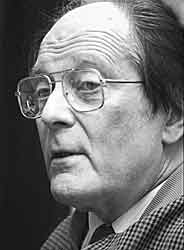
Jaan Kross was an Estonian writer. He was nominated several times for the Nobel Prize in Literature during the early 1990s.
A fabliau is a comic, often anonymous tale written by jongleurs in northeast France between ca. 1150 and 1400. They are generally characterized by sexual and scatological obscenity, and by a set of contrary attitudes—contrary to the church and to the nobility. Several of them were reworked by Giovanni Boccaccio for the Decameron and by Geoffrey Chaucer for his Canterbury Tales. Some 150 French fabliaux are extant, the number depending on how narrowly fabliau is defined. According to R. Howard Bloch, fabliaux are the first expression of literary realism in Europe.

Wycliffe's Bible is the name now given to a group of Bible translations into Middle English that were made under the direction of John Wycliffe. They appeared over a period from approximately 1382 to 1395. These Bible translations were the chief inspiration and chief cause of the Lollard movement, a pre-Reformation movement that rejected many of the distinctive teachings of the Roman Catholic Church. In the early Middle Ages, most Western Christian people encountered the Bible only in the form of oral versions of scriptures, verses and homilies in Latin. Though relatively few people could read at this time, Wycliffe’s idea was to translate the Bible into the vernacular, saying "it helpeth Christian men to study the Gospel in that tongue in which they know best Christ's sentence".
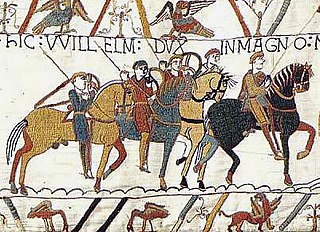
Taillefer was the surname of a Norman jongleur (minstrel), whose exact name and place of birth are unknown. He travelled to England during the Norman conquest of England of 1066, in the train of William the Conqueror. At the Battle of Hastings, Taillefer sang the Chanson de Roland at the English troops while juggling with his sword. An English soldier ran out to challenge him and was killed by Taillefer, who then charged the English lines and was engulfed. Strangely, Taillefer is not depicted, by name at least, on the Bayeux Tapestry.

City of Golden Shadow is a science fiction novel by American writer Tad Williams, the first book in his Otherland series. The "Otherland" of the book's original and series title is a virtual world or worlds. "City Of Golden Shadow" is a city in the Otherland network, to which the main characters are being summoned.
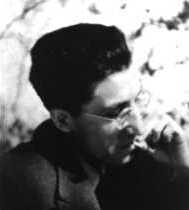
Cesare Pavese was an Italian poet, novelist, literary critic and translator. He is widely considered among the major authors of the 20th century in his home country.
Colin Muset was an Old French trouvère and a native of Lorraine. He made his living in the Champagne by travelling from castle to castle singing songs of his own composition and playing the vielle. These are not confined to the praise of courtly love that formed the usual topic of the trouvères, but contain many details of a jongleur's life. His complete works are eighteen: nine attributed in chansonniers, three self-referencing, and six whose attributions are based on modern scholarship. Twenty one poems credited to him were edited and published by Joseph Bédier in 1912 (Paris). Two further editions appeared in 2005: one by Callahan and Rosenberg with translations into modern French, and, with translations into Italian, an edition by Massimiliano Chiamenti, which reduced his authentic corpus to sixteen poems. Oxford Music online, lists 12 songs. Nine of his poems have surviving music. Seven are chansons jongleuresques, that is, songs describing the life of a jongleur. His three serventois condemn the avarice of the nobility, but his moralising is balanced by self-deprecating humour. He also wrote two descorts, one lai, and one cynical tenson with Jacques d'Amiens.
Wulfhelm was Bishop of Wells before being promoted to the Archbishopric of Canterbury about 926. Nothing is known about his time at Wells, but as archbishop he helped codify royal law codes and gave lands to monasteries. He went to Rome soon after his selection as archbishop. Two religious books that he gave to his cathedral are still extant.
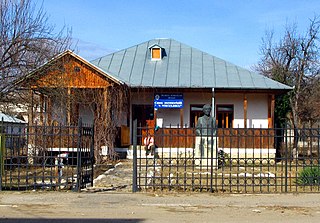
Vasile Voiculescu was a Romanian poet, short-story writer, playwright, and physician.

In Christology, the Logos is a name or title of Jesus Christ, derived from the prologue to the Gospel of John "In the beginning was the Word, and the Word was with God, and the Word was God", as well as in the Book of Revelation, "And he was clothed with a vesture dipped in blood: and his name is called The Word of God." These passages have been important for establishing the doctrine of the divinity of Jesus since the earliest days of Christianity.
La Terre is a novel by Émile Zola, published in 1887. It is the fifteenth novel in Zola's Rougon-Macquart series. The action takes place in a rural community in the Beauce, an area in central France west of Paris. The novel is connected to others in the series by the protagonist, Jean Macquart, whose childhood in the south of France was recounted in La Fortune des Rougon, and who goes on to feature prominently in the later novel La Débâcle.

Melchizedek, Melkisetek, or Malki Tzedek, was the king of Salem and priest of El Elyon mentioned in the 14th chapter of the Book of Genesis. He brings out bread and wine and blesses Abram and El Elyon.

Johann Heinrich Callenberg was a German Orientalist, Lutheran professor of theology and philology, and promoter of conversion attempts among Jews and Muslims.

Elias (de) Fonsalada was a troubadour from Bergerac in the Périgord. Only two cansos of his survive.
Hyder Bux Jatoi (1901–1970) was a revolutionary, leftist, peasant leader in Sindh, Pakistan. He is known by his supporters as "Baba-e-Sindh". He was also a Sindhi writer and poet. He was for many years the president of the Sindh Hari Committee, a constituent member of the National Awami Party. The singer & revolutionary activist of Sindh Jiji Zareena Baloch was always quoted Comrade Hyder Bux Jatoi before singing his "Jeay Sindh aen jeay Sindh, Jam-e-Muhabat pieay Sindh" and "Paan Kkay haan aazad ghurjay watan" poetry.

Bernard Häring was German Roman Catholic, Moral theologian, and a Redemptorist priest.
Jeppe on the Hill; Or, The Transformed Peasant is a comedy by Ludvig Holberg, first played in Copenhagen in 1722. It has a special status in Danish theater, although it is rarely known in the English-speaking world. Playing Jeppe has a similar status to playing Hamlet in English theater. In the play, Jeppe is a drunkard peasant who is abused by his wife, Nille. The Baron and his court find him in a drunken stupor and decide to play a joke on Jeppe.

"A Malefactor" is an 1885 short story by Anton Chekhov.














